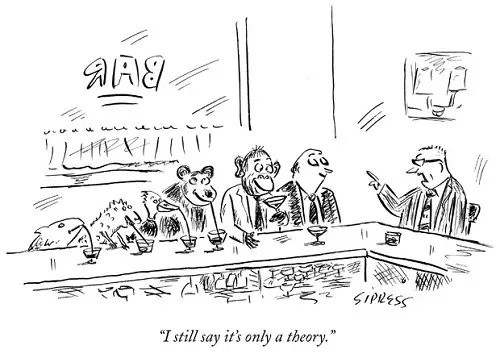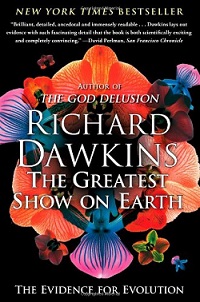|
TRANSLATE THIS ARTICLE
Integral World: Exploring Theories of Everything
An independent forum for a critical discussion of the integral philosophy of Ken Wilber
SEE MORE ESSAYS WRITTEN BY FRANK VISSER
Only a Theory
or The Only Theory?
Controversies around the Theory of Evolution
Frank Visser
 ® David Sipress, published in The New Yorker, 23 May 2005.
® David Sipress, published in The New Yorker, 23 May 2005.
Richard Dawkins is not the final word on evolution, but he is definitely the first word.
In debates about the theory of evolution among its opponents, it has often been said that it is "only a theory".
That, of course, is a bit disingenuous. It suggest it is very close to just an educated opinion among scientists. In reality, it is a very strong theory, that has survived 150 years of research and thought. So instead of saying it is just a theory we should say it is a great theory!
Does that mean it is proven beyond any doubt? No, in science nothing is finally proven. The goal is to look for the best empirical support for a given theory. And if the scientific community agrees that some theory has the best available support, then we should consider it "settled science". Us mortals can do no better than go with that.
It would be like saying, "gravity is just a theory". For who doubts the force of gravity?[1]
Among the staunch defenders of evolutionary theory, especially in its neo-Darwinian version, the opposite tendency can be seen. The theory of evolution is not just a theory, but the only theory!
When Richard Dawkins was contemplating a title for his book on the evidence for evolution, his first idea was Only a Theory. But that title turned out to have already been taken, by Kenneth Miller's Only A Theory: Evolution and the Battle for America's Soul. Only a Theory? became the title of his first chapter. He finally chose for The Greatest Show on Earth, taken from a t-shirt he often wore when giving lectures. It referred to the travelling "circus, menagerie and museum of freaks" P.T. Barnum exploited in the 19th century.
The other title-candidate on that t-shirt was "The Only Game in Town". It conveys the feeling of most scientists regarding the theory of evolution: there is basically no alternative, scientifically speaking. Creationism or Intelligent Design are no real alternatives because they undermine the essence of science: empirical support. When God or Spirit has created the diversity of nature, what's left for science to discover? (Ironically, one creationist organization is called the Discovery Institute).
Does that mean that a particular brand of Darwinism (or any other evolutionary paradigm) is the final word? Again, of course not. Scientific theories can always be superseded by new ones. More often than not, they prove not to be wrong as well as partial.
Some have suggested there are a dozen different ways to view evolution (see Carter Phipps' essay "The Real Evolution Debate"). But they break down in 6 scientific ones and 6 philosophical-religious versions.
- The Neo-Darwinists (Dawkins, Gould, Dennett, E.O. Wilson)
- The Progressive Darwinists (Carroll, Jablonka, Lamb)
- The Collectivists (Bloom, Lynn Margulis, David Sloan Wilson)
- The Complexity Theorists (Goodwin, Kauffman, Laszlo)
- The Directionalists (Conway Morris, Gardner, Wright)
- The Transhumanists (Ettinger, Gibson, Kurzweil)
- The Intelligent Designers (Behe, Dembski, Johnson)
- The Theistic Evolutionists (Miller, Peacocke, Polkinghorne)
- The Esoteric Evolutionists (Blavatsky, Steiner, C. Wilson, Tarnas)
- The Process Philosophers (Whitehead, Hartshorne, Griffin)
- The Conscious Evolutionists (Teilhard de Chardin, Dowd, Marx Hubbard)
- The Integralists (Aurobindo, Gebser, Wilber, Combs)
As you can see from the above, Richard Dawkins is not the final word on evolution, but he is definitely the first word. (And Wilber has not succeeded in presenting this first word faithfully. I have learned more about evolution from Dawkins than from Wilber).
The first six groups of evolutionists may disagree vehemently, as would be the case in any healthy area of science, but they subscribe to the same basic idea: that science is looking for a naturalistic explanation of the diversity of life. This is what is meant by "the only game in town". Evolutionary theory is not about the origin of life, or about the fine-tuning of the Universe, but about how to explain the evolution of life's forms.
The second six groups of evolutionary thinkers are all in a way of the opinion that science needs to be supplemented by something else: religion, revelation, speculative philosophy or mystical insight. They either postulate that God has intervened during evolution, or that evolution is guided by various intelligences, that there's a "creative advance into novelty" in the cosmos at large, an "Eros in the Kosmos" or even a final spiritual goal or Point Omega.
There may be value in the musing of these philosophers, but the proper approach would be to first fully try to explain life's diversity by naturalistic explanations, and only in the last resort turn to spiritualist notions. There's an ingrained tendency among these transcendenatal folks to misrepresent or even ridicule the scientific approach to evolution—to justify their own. Ken Wilber is no exception, I am ashamed to say.
NOTES
[1] You would be surprised: Dutch physicist Vincent Icke has just released a book (in the Dutch language) called "Gravity does not exist". See Wikipedia's "Entropic gravity" and Daily Galaxy's article on the subject. Never a dull moment in science!
|

 Frank Visser, graduated as a psychologist of culture and religion, founded IntegralWorld in 1997. He worked as production manager for various publishing houses and as service manager for various internet companies and lives in Amsterdam. Books: Ken Wilber: Thought as Passion (SUNY, 2003), and The Corona Conspiracy: Combatting Disinformation about the Coronavirus (Kindle, 2020).
Frank Visser, graduated as a psychologist of culture and religion, founded IntegralWorld in 1997. He worked as production manager for various publishing houses and as service manager for various internet companies and lives in Amsterdam. Books: Ken Wilber: Thought as Passion (SUNY, 2003), and The Corona Conspiracy: Combatting Disinformation about the Coronavirus (Kindle, 2020). 
